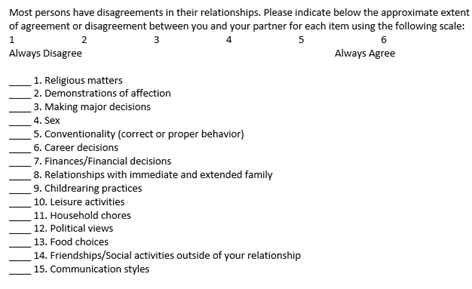Relationships
What Do Couples Fight About?
Disagreements are inevitable, but some problems are more common than others.
Posted June 29, 2021 Reviewed by Ekua Hagan
Key points
- Communication problems, time together, and money are common sources of conflict for couples.
- Couples often fight about issues regarding trust and sex early on, while those who have been together longer fight more about chores and habits.
- Stress may exacerbate communication issues for couples, so it's good to discuss any recurring issues when things are going well.
Every couple has at least one recurring conflict — the one you should have just videotaped the first time you had it because you end up having the same fight over and over again. What is yours about? Communication? Money? Chores? Intimacy? In-laws? Whether the toilet paper goes under or over?
Here's the research on what couples are fighting about
One way that researchers determine what couples fight about is by giving couples a list of potential sources of conflict and having them rate each one. For example, in a study I ran with 100 cohabiting couples, each partner rated the extent to which the couple agreed or disagreed on 15 different topics. Here they are, in case you want to try it yourself:

On average, people tended to report some conflict (around a 4) for all of these topics and they had very similar mean levels, but there was also a lot of variability across topics and couples.
Family relationships had the highest percentage of people who reported always disagreeing (3%), but at the same time, most people reported almost or always agreeing about family (58%). Religious matters and finances were also topics that had higher percentages of disagreement (2.5%). But like family matters, religious matters also had the highest proportion of people who reported they always agree with their partner (37%). It seems that for a few people, matters related to family and religion are recurring issues, but for many people, they are rarely, if ever, a source of disagreement. Overall, the top three issues that people in our study tended to report disagreeing about the most were communication styles, conventionality (the proper way to act), and sex, followed closely by chores and finances. The least fought-about issue was leisure activities, with only 2% of people reporting it as always or almost always an issue.
In another study, researchers tracked 100 couples with children for 15 days and gave them a list of potential sources of conflict to report on each day. They found that children, household tasks, and communication were the most frequent sources of conflict across those two weeks, while intimacy (displays of affection, sex), time spent with friends, and personality were the least common sources of conflict (Papp et al., 2009).
In a larger one-time study of over 1,000 participants, communication was selected as the most common source of conflict, along with habits, chores, and finances. More than a third of the sample also selected decision-making, quality time together, sex, and screen time as top sources of conflict. Among parents, parenting was the top source of conflict (52%; Meyer & Sledge, 2021). At the bottom of the list were religion and politics.
A study looking at heterosexual, gay, and lesbians couples found that sources of conflict are similar across same-sex and heterosexual relationships, with intimacy and power as the top sources of conflict among all couples in that sample (Kurdek, 1994).
With checklists, the top sources of conflict might depend on which topics are included in the list. Instead of giving people a checklist, researchers have also tried just asking people what they fight about. A group of researchers (Lopes et al., 2020) surveyed individuals to identify common reasons for conflict and found eight main areas: Inadequate attention/affection, Jealousy/Infidelity, Chores/Responsibilities, Sex, Control/Dominance, and Future Plans/Money.
When Bradbury and Karney from the UCLA Marriage and Close Relationships Lab asked married couples to report their top three sources of conflict, they found that the top sources of conflict came from outside of the relationship: money, chores, finding time together, dealing with in-laws, and parenting. I have used the same method with younger couples and found communication, time together, and affection were some of the more common areas of complaint.
In line with the idea of a recurring conflict, researchers find that conflict patterns are fairly stable, with couples facing the same problems throughout their relationships. However, couples also fight about different issues at different phases of their relationships. Communication, time management, and money seem to crop up as frequent sources of conflict across relationship phases, but jealousy, trust, and sex may be more common issues earlier in relationships (Buss, 1989), while chores and parenting become bigger issues as couples move in together and have children. Most research on conflict focuses on younger and middle-aged married couples, but one study found that communication, chores, and habits were the most frequent sources of conflict among older, empty-nesting couples (Papp, 2018).
A lot of time, money, and energy have been thrown into helping couples communicate better with the belief that if couples can figure out how to communicate well, they can tackle any issues that come their way. After all, communication is consistently reported as a top source of conflict.
Unfortunately, teaching couples to communicate better has not been as successful as researchers and clinicians had hoped. It seems that couples have a way of communicating that is not easy to change, but also that people tend to have worse communication when under stress and strain (Williamson et al., 2013) and poor communication matters more in these moments (Nguyen et al., 2020).
What does this mean? While people frequently say that communication is a source of conflict, it may be that they are more likely to be having poor communication if there are other problems going on (financial strain, work stress). This also suggests that when things are going well, it might be a good time to try to talk about your recurring issue.
Whether you fight about money, chores, or the proper direction of toilet paper, know that you are not alone. Conflict is inevitable in relationships and couples have many different reasons that they fight. However, whether or not an issue turns into a fight may be due in part to what else is going on in your life, including how well you are sleeping.
15 tips for dealing with conflict
References
Buss, D. M. (1989). Conflict between the sexes: Strategic interference and the evocation of anger and upset. Journal of Personality and Social Psychology, 56(5), 735.
Karney, B. R., Bradbury, T. N., & Lavner, J. A. (2018). Supporting Healthy Relationships in Low-Income Couples: Lessons Learned and Policy Implications. Policy Insights from the Behavioral and Brain Sciences, 5(1), 33–39. https://doi.org/10.1177/2372732217747890
Kurdek, L. A. (1994). Areas of Conflict for Gay, Lesbian, and Heterosexual Couples: What Couples Argue about Influences Relationship Satisfaction. Journal of Marriage and Family, 56(4), 923–934. https://doi.org/10.2307/353603
Lopes, G. S., Shackelford, T. K., Buss, D. M., & Abed, M. G. (2020). Individual differences and disagreement in romantic relationships. Personality and Individual Differences, 155, 109735. https://doi.org/10.1016/j.paid.2019.109735
Meyer, D., & Sledge, R. (2021). The Relationship Between Conflict Topics and Romantic Relationship Dynamics. Journal of Family Issues, 0192513X21993856. https://doi.org/10.1177/0192513X21993856
Nguyen, T. P., Karney, B. R., & Bradbury, T. N. (2020). When poor communication does and does not matter: The moderating role of stress. Journal of Family Psychology, 34(6), 676–686. https://doi.org/10.1037/fam0000643
Papp, L. M. (2018). Topics of marital conflict in the everyday lives of empty nest couples and their implications for conflict resolution. Journal of Couple & Relationship Therapy, 17(1), 7–24.
Papp, L. M., Cummings, E. M., & Goeke-Morey, M. C. (2009). For Richer, for Poorer: Money as a Topic of Marital Conflict in the Home. Family Relations, 58(1), 91–103. https://doi.org/10.1111/j.1741-3729.2008.00537.x
Williamson, H. C., Karney, B. R., & Bradbury, T. N. (2013). Financial strain and stressful events predict newlyweds’ negative communication independent of relationship satisfaction. Journal of Family Psychology, 27(1), 65–75. https://doi.org/10.1037/a0031104




